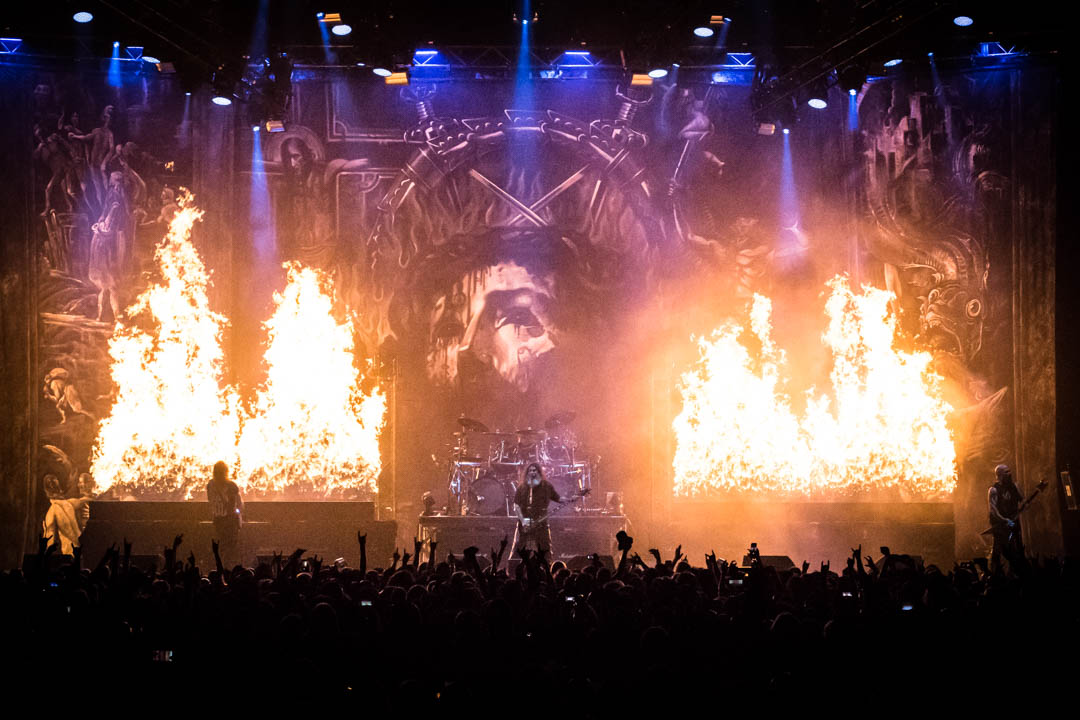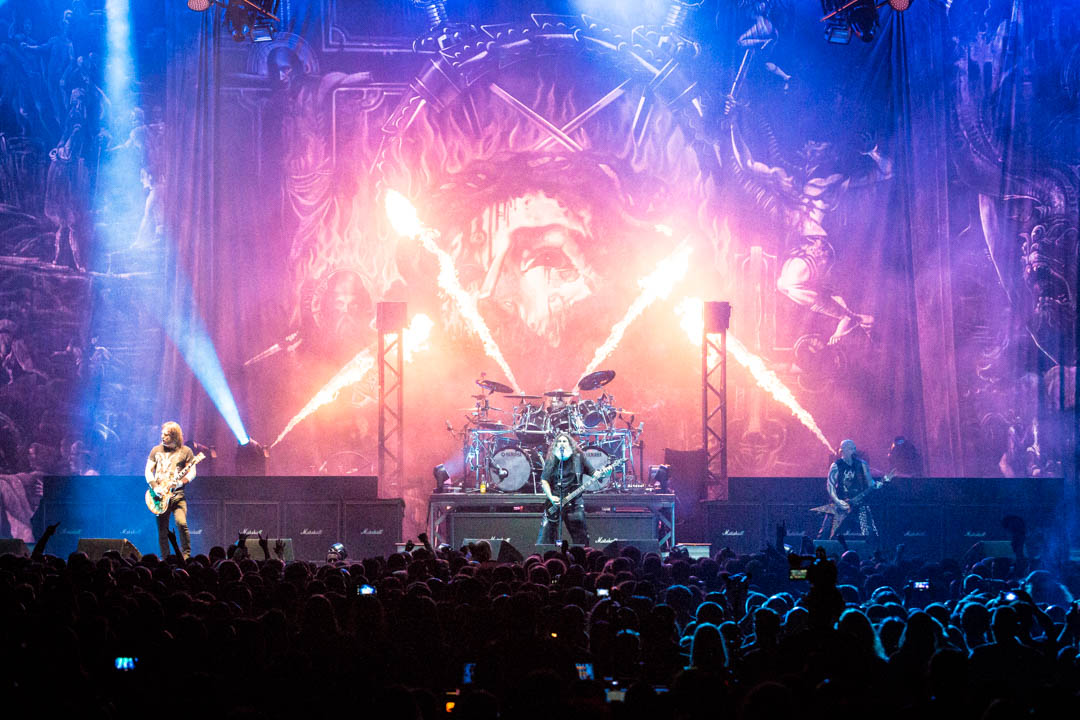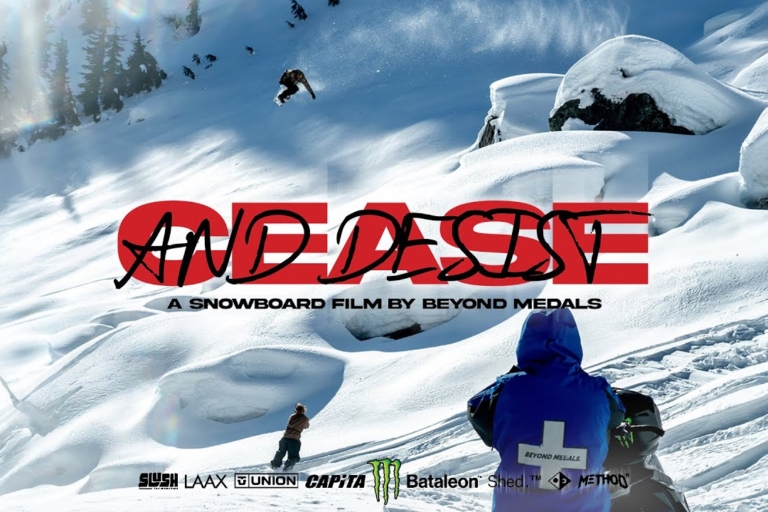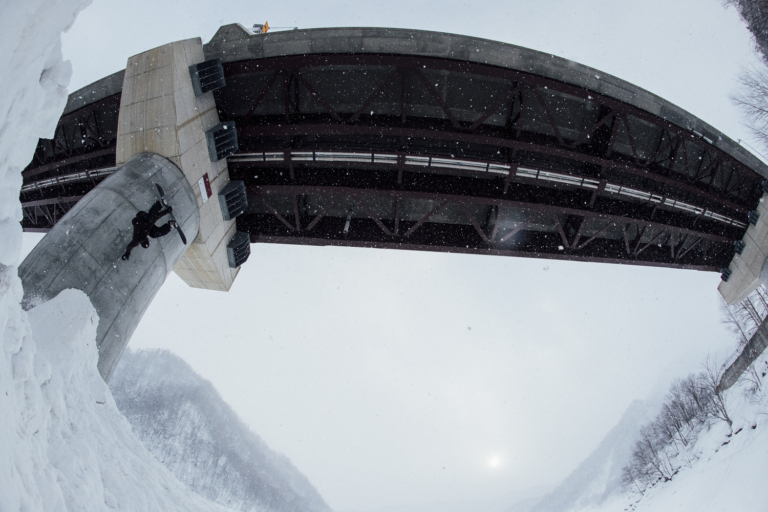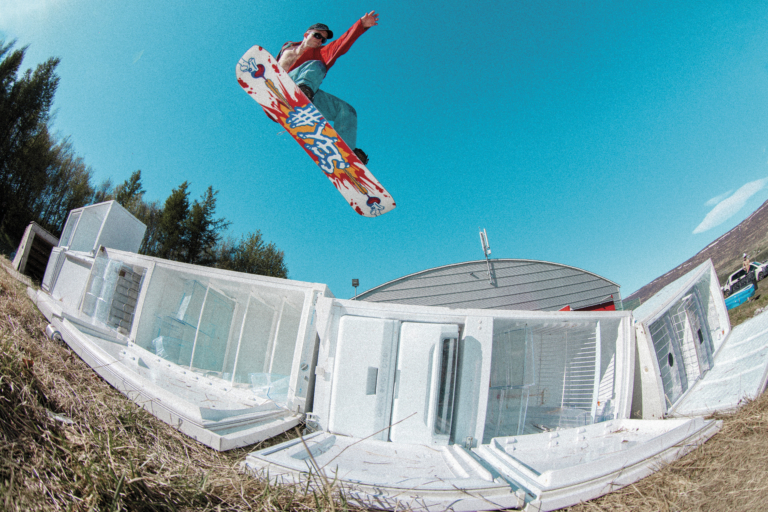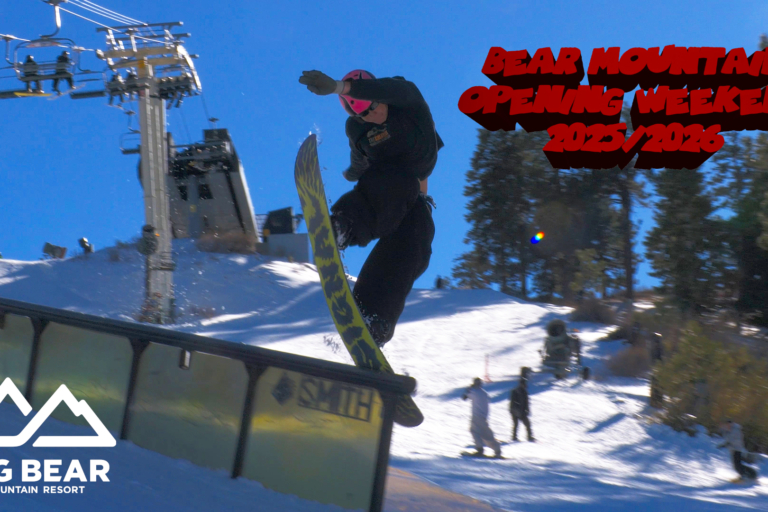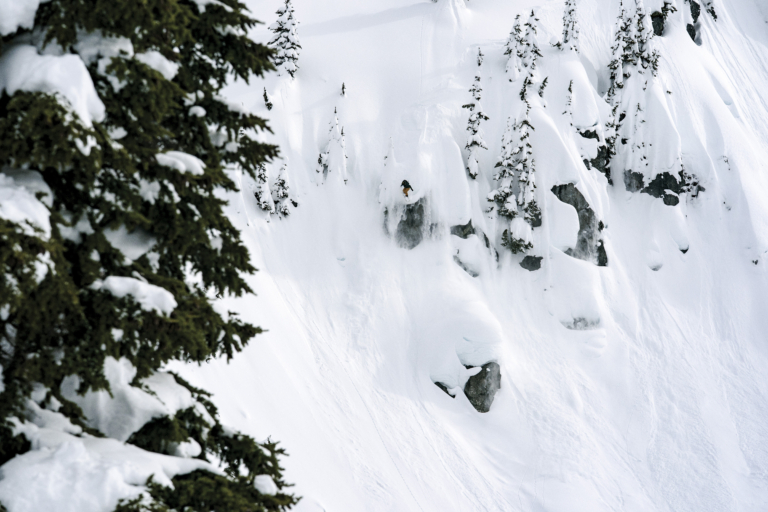The truth is they don’t need much of an introduction. Slayer has been synonymous with metal music since they were instrumental in the genre’s introduction 36 years ago. Their unforgiving speed and combative riffs have been iconic elements to the thrash metal scene and a pivotal reason for their reigning position as one of “The Big Four.” And while the group has gone through many internal changes over the years including the death of founding member Jeff Hanneman and the loss of Dave Lombardo, their show has never faltered or slowed. In fact, it has done the opposite, gaining new fans year by year, and ultimately growing into one of the biggest bands and subsequent brands in music.
Over the course of their 36 year reign, snowboarding has grown and developed from the first Snurfer to the technically advanced designs we ride today. And throughout the growth and development of our beloved passion, Slayer has been there to kick dirt in our eyes, to boil our blood, and to instill in us the fire needed for progression. I sat down with lead guitarist and founding member Kerry King before their recent performance to talk about legacies, Slayer’s relationship to board sports, and the role their influence plays in politics and beyond.
Make sure to catch Slayer on the next stop of their Repentless Tour.
All photography by Owen Ringwall

Correct me if I’m wrong, but this year marks 36 years of Slayer, since 1981, right?
Yup, the first record came out in ’83.
What did you see in Slayer and your music in the early years that told you if you kept going it would become something?
Early on, especially when we first started going to Britain, not so much Europe, but Britain for sure, there were these pockets everywhere, there was always a metal faction and a punk faction, and we were the ones that kind of brought those ideas together. And not just musically, but the fans as well. It was basically just teaching the punks and the metal heads that we are all there for the same reason and to quit beating each other up. You know, I can’t say we single-handedly did that by any means, but we were a part of it, and that was cool because that just made the fan base expand.
Do you have any good stories from those early clashes?
No, not really. You know, it was very different those first few times. What they used to do back then is they would spit on you. And they’d be like, “give me a pick.” That was their culture, and it was offensive to me. I would be like, “Why are these people spitting on me? They paid to watch us fucking play, and I’m just getting gobbed on.” So that took a few years to figure out and then that kind of weeded its way out. It was just a different culture that I never had any idea existed. It was weird, very weird. But you know, they weren’t doing it maliciously, that was just what they did. And I had to get used to it – we all had to get used to it.

So, “The Big Four.” What was it like for Slayer to be an instrumental part of the initial push in thrash metal?
Well, “The Big Four,” we didn’t name ourselves that, that was the media. It just stuck, and everyone uses it. So when we did those shows [The Big Four Tour] I thought man, this will be really cool for the fans. For me it was just another show, whatever, and I got out there and a week in I was like, “This is fucking rad,” I was having a good time. And you know Metallica, we didn’t have a beef or anything, we just ran in different circles for twenty to twenty five years. And while we might do a random festival with them in Europe and see them once in awhile, when I sat down with them [over The Big Four Tour] it was like, “This is fun man, we need to keep in touch.” It is cool to have those contacts again, because for years we didn’t talk, and not because there was an issue, we just were in different circles, so it was cool for me to get back to the early days.
That’s interesting you say that, because within snowboarding it’s very much the opposite– most riders on the top tier are actually really close. Many are even on the same event circuit, so there tends to be a lot of interaction. I never would have guessed that there would be such a disconnect between top players in the music industry.
I like the performance. I would never make another record ever if I didn’t have to.
Well you know, once the ‘90’s came around, Metallica didn’t need anybody. They don’t need an opener, they don’t need a band like us to open for them, and they don’t need to pay us what we’re worth. That’s just business because Metallica is on their own different plane.
Has there ever been any contempt for or jealousy of Metallica’s size? Obviously you guys have substantiated yourselves ten times over, but is there any element of comparison or competition in your mind?
I think in the ‘80’s, up until the Black Album and Seasons – because they came out around the same time. Whenever the new product would come out, we would all be stoked to get it. It was a fun camaraderie, but also a little bit of “I’m going to make a better song than that.” Because I know Kirk [Hammett] would be breaking down the door to get new Slayer when new Slayer came out, and when Ride the Lightning came out, I had to get it that day. Because we’re fans, I’m still a fan. It wasn’t a contest, but were always trying to do what the other guys are doing, and trying to do something better.

I think that the connection between Slayer, snowboarding, and similar “action” sports, kind of speaks for itself. There is an aggressive, “pump-up” element to the music that is often directed into said sport. From your perspective, what has Slayer’s role been in interacting with separate, yet intrinsically related industries like snowboarding?
My role is to just keep pumping out good tunes.
So you strictly view your role within Slayer as musical? Do you ever look at your position of influence as more than just song related?
Yeah, I mean that’s why people like us I think. We don’t try to be anything we’re not, and we didn’t try and do that out of the gate, either. We were lucky that we got together and found people that were inspired to make the same kind of music. I make up things for myself; I make up things that I think fans will like. Sometimes in lyrics – like this last record in particular – I did a bunch of unifying things, between the band, fans, and anyone listening to it. Because I thought it was important, with Dave [Lombardo] leaving and Jeff [Hanneman] dying, I wanted to show unity between us, and the fans as well. So that is one thing that I went out of my way to accomplish on this one.
How much of the experience for you is the performance vs. writing the music?
That’s what I like about the X Games and similar sports is that every year someone is doing something new, trickier, and harder.
I like the performance. I would never make another record ever if I didn’t have to. But that being said, I do enjoy making up songs. I have said on a number of occasions that it’s like looking for the perfect riff, and not knowing if you have written it, come close to it, or anything like that.
Recently you had an interesting situation with the whole Trump photo fiasco, which raised the question, when do you use your channel for political leverage, and when do you just let music be music? Similarly, this past season snowboarding had its own brush with politics when many riders reacted to Trump’s decision to pull out of the Paris Climate Agreement. In your mind, at what point is it appropriate to use your channel and influence to make a difference, and at what point do you stay out of it and let your role remain as an escape?
I think Trump is a more individual ideology, for sure. The band, you know, whenever I try and address political songs, which we do, I can’t say we don’t, but I will base it on the US Government because that’s the government I know, but I try to make it vague enough so that anyone in any country can relate to it. I hate my chancellor, or, I hate my prime minister, I hate my government, I try to make it so that anyone can get something out of it, because if it was pinpointed at America, only Americans would love that song – or hate that song depending on what I say in it. I have one on the next record that is basically about Trump’s nonsense, but it’s really going to be about the republicans just fucking things up.

Do you picture the political aspect of your music as more of an expression of emotion then, or as a call to action?
It could be both. I mean a call to action would be something like “Take Control” off of the last record. And that’s one of those unifying statements where I say, “We will take control.” That’s not just us, that’s everyone. I expect for the people that are in the crowds and sing the lyrics at us for that to be a big line.
I find that is one of the most fascinating parts about Slayer, the unifying element found in chaos. Everything stems from this aggression and anger, but the takeaway always resembles a cohesive brotherhood.
Slayer is a message of strength. It’s a message of power.
It is, and you know it evolved to that.
Looking back on the past 36 years, the Slayer band has become a brand that ultimately has had countless collaborations and partnerships, many within snowboarding and many more with other industries, how do you view and manage that side of Slayer?
This year was one of my favorites. I have always worn Metal Militia stuff, and we did a Slayer / Metal Militia co-brand – which I think should have happened ages ago because, you know, God, I met [Brian] Deegan in the early 2000’s. We used to go out and watch them practice. I was watching this year’s X Games because I had some days off, and I watched the Motorcross events and the big ramp for skateboards, the one Danny Way built years ago and now all of the younger people are killing – not killing themselves on it – but you know. Just extending the envelope. That’s what I like about the X Games and similar sports is that every year someone is doing something new, trickier, and harder.
You have a relationship with Danny Way, right?
Yeah, I saw him, I guess just before I Went to South America this year. He came out and visited, before that I hadn’t seen him in a long time.
Has he ever spoken to you about your influence on his skateboarding?
I don’t think so. This last time it was more relaxed, but all of the other times that Danny and I met you could tell that he was still being a fan-boy, and I don’t mean that detrimentally or derogatorily or anything like that. He’s a superstar. He is just more into Slayer than I am a fan of what he does. I am a fan of it, just not to that level.

That is interesting that you are able to acknowledge that difference.
Absolutely, you know when I was a kid I skateboarded a bit, I did BMX a bit, I wasn’t racing or anything, and we didn’t have cool ramps like people do these days, but friends and I would set up a piece of 4×8 plywood and set it on a picnic table and that would be our ramp. Do tricks and stuff on that thing. I had a lot of fun times with BMX and even built a few bikes myself. It was fun, but then guitar came around.
If you were to address people within the snowboarding community, us fans of your music, what would you want them to be getting out of Slayer?
When you die you are burned or put in the dirt and nobody is going to see you again.
Hopefully it puts them in the state of mind to have a kickass run, or to push their imagination to do a trick they never thought of. What more could you really ask?
Do you ever hope that the Slayer brand instills a more powerful or substantive message?
I think Slayer is a message of strength. It’s a message of power. It’s very edgy street metal. There is a reality to it. I mean sure, I sings songs about satan, but do I believe in satan? No I don’t, but it is imagery that we started with and carried on throughout our career. And I have never been shy about saying exactly what is on my mind. It is a good topic for Slayer, it works. I have a song for the next album that’s more fantasy based. Let’s say fantasy — that’s a good word, [laughs] but that said, there are songs like “Repentless,” there are songs like “Take Control” – which I mentioned earlier– which is just standing up to the government, be it whatever government it is. It is about unity, a unifying lifestyle like you said.
It’s hard for me to talk about it because I am so close to it. But fans have their own perspective too. I think they see us as extensions of themselves, they just don’t know how to play guitar maybe. I don’t dress like this because I’m in an interview, I dress like this if I’m going to fucking Target, [laughs] this is who I am. But you know, I think people see us as if we are the same as them. And I think we are. Just four dudes that can play the same type of music that we all love and that our fans dig us for.

You mentioned the religious element, and you have always somewhat flirted with various satanic elements in Slayer. What role does religion play in your life personally?
None at all. I’m not one of those half-hearted agnostics either. When you die you are burned or put in the dirt and nobody is going to see you again.
So it is purely just for imagery and themes–?
For sure, you know we started that way. Show No Mercy has the devil looking dude standing there with his sword. What else did I write back then? “Black Magic.” Jeff wrote “The Anti-Christ.” We started there, and rather than take out that element as we grew up and gained a stronger opinion – because we were 18, I didn’t know what I believed, maybe there was a devil – on my path to being 2017 Kerry King, I decided there is no god, there is no devil, but if there was a god, god hates me most. So that’s where “God Hates Us All” came from [laughs].
It acts as a kind of fuel.
You know it’s interesting, I like to throw things on the table, because a lot of people in America, and throughout the world, they don’t make up their own mind. Their mind is made up for them, and they have to fit in with their family, their friends, whatever. And I just like to bring provocative questions to the table. Like “God Hates Us All” – I had a real problem after I wrote that song. What do you say next? What do you say after “God hates us all”? You just fucked everybody up. But obviously I found things, and I like to throw out taboo sorts of ideas. Sometimes I give my opinion, and others I leave it vague, but in interviews, I always give my opinion.





